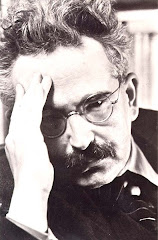Yehudah ben Leibovitch of Lublin: In Apology, Socrates famously recounts how he set out trying to disprove the Delphic Oracle's proclamation that he was the wisest man, only to realize that, in fact, the oracle was right along. Socrates explains that he is the wisest man, not because he possesses any positive knowledge, but simply because unlike the other men who claim to know, he knows that he does not know anything, and in so knowing, knows slightly more than anyone else. What say you of the matter, friend?
Friedrich Philosophicus of Tübingen: It is as you say, then, Yehudah.
Y: This argument is quite sophistic, especially coming from a man who allegedly spent a great deal of time arguing and refuting sophists. For according to Socrates' espoused views, in order to judge in any matter one must possess knowledge of that matter. Only the prophet may distinguish between true and false prophecy. Only a doctor may separate the good doctor from the bad one. How then, is Socrates able to judge that the men he comes into contact do not actually know what they claim to know. How can Socrates, in short, say that such men know nothing, and at the same time claim that he himself knows nothing? For if Socrates knows nothing, by what authority can he disprove his interlocutors who claim knowledge for themselves?
F: By reason, this seems likely.
Y: We see, then, that Socrates, at least the way Plato portrays him in his Apology, is nothing but a skeptic. And we also see that his skepticism cannot hold up. Since all skepticism which is unmitigated and dogmatic inevitably collapses upon itself, just as a band of thieves, once it has stolen all it can from the innocent, rips itself apart out of sheer greed, it is no coincidence that Socrates can do nothing but die. And one of his friends subtly points this out in Crito. Socrates refuses to escape from his death not because of any commitment to justice, but simply because he is lazy. Do we agree?
F: Assuredly, unless the poet lies.
Y: Of course, brother, Socrates does make many positive arguments in other dialogues, concerning beauty, love, the soul, etc. But it cannot be ignored that whenever Socrates is at his most profound, he is often also being a wise-ass. Socrates treads the line between wisdom and cunning. But is Socrates' cunning an enemy to wisdom or an asset to it? I guess the answer to this question depends on how we understand the complicated role which Socrates plays for Plato, the writer of the dialogues. What say you?
F: This seems likely enough.
Y: One possibility is that Plato uses the dialogue form precisely so that he can make wise-ass arguments, but instead of taking the blame for them, can simply say, "Socrates said it, not me." Another possibility is that Plato uses the wise-ass moments in Socrates as a way of inviting us to challenge Socrates just as Socrates challenges his interlocutors. And yet another option: Socrates isn't a wise-ass, since in a paradoxical way, being but a mere character in a dialogue, his words and actions must are not real, and thereby are not ingenuine either. That is, within the frame of a dialogue, Socrates' words may be excused, even if otherwise they could be seen as annoying, petty, and self-important.
F: This dialogue is over. Since we only agree and since you do not let me speak.
Thursday, July 24, 2008
Subscribe to:
Post Comments (Atom)






No comments:
Post a Comment